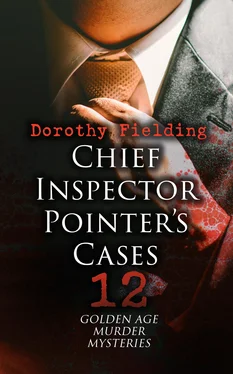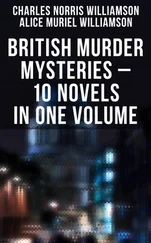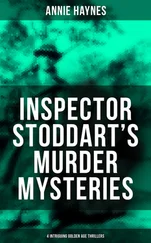"You think his having been seen near Riverview at that hour so bad? Grandfather? We live near there, you know," her voice quivered, "wouldn't it explain matters if people knew that Phil and I had just got engaged—secretly? Suppose Mrs. Tangye had guessed that, and for that reason wanted to help him—and me. Philip only asked for the money so as to marry me, you know."
"Eh?" Dorset Steele wheeled, and stood looking at her like a rook inspecting a Jenny Wren. Then he took a turn up and down, his hands under his coat-tails that flapped in time to his tread.
"You'll break down when you're cross-questioned. For this case may yet go before a jury. You'll break down, and then where will we be? Worse off than ever! The jury—"
"I shan't break down. Phil asked me to marry him many times. And I—I—" she hung her head. Two bright drops rolled slowly over her soft young cheeks. "I don't want to tell a lie, but I must, oh, I must save him! In my heart I said yes. Surely I can truthfully say I accepted him. I did in my heart. Where's my bag, my hanky's in it—"
"M-m," mumbled the solicitor gruffly, but wiping the tears off with a very tender touch. "Yes—that might be a help. He was hovering around Twickenham on Tuesday to see you? I guessed as much."
"Oh, yes! That's quite true."
"It's all quite true, or it's of no use," snapped Dorset Steele. "And that about Mrs. Tangye—yes—yes—that might help. But what about yourself?" he shot the question at her savagely. "What about yourself, heigh? All the notoriety? All the ordeal? Though you've grit in you. What about yourself, child?"
"Oh, grandfather," the girl, quite undismayed by his glare, caught hold of his coat with both hands and buried her face between them, "if you save him you save all of me. I was such a pig to him! I thought he was too easy-going, too contented. I thought he needed waking up. I only talked to him about money—money—money, every time he asked me to marry him. The last time I jeered at him because he was poor."
"Are you going to tell that to any jury?" stormed Dorset Steele, apparently beside himself with indignation, but patting the back of one brown little hand. "Because, if you are, it's all up with him. There's the motive. Don't you see?" This time he released himself resolutely. "Barbara, my dear, are you sure he's innocent?"
She did not raise her head. "Grandfather, you know he's innocent!" And even the keen old lawyer did not notice that she had not answered his question.
"M-m, well, perhaps I think so—but you see his father and I were old friends—" then the solicitor shook off his momentary weakness, "but the only question that concerns us, is what will the jury think? Now put your bonnet on, and I'll take you to see him. If you've thought it over. Weighed the consequences. Heaven knows what your mother will say when she hears of it!"
"Put my what on? What do you suppose this is?" Barbara touched the velvet tam o'shanter she wore. "I'm ready. As to mother—she's still in Yorkshire."
According to all novelists, Barbara ought to have stopped to use her powder-puff before starting off. She did not own that apparently inevitable adjunct to every woman. Certainly Philip Vardon noticed nothing amiss as the door swung open and Dorset Steele barking: "I've brought some one to see you," shut it, and walked the landing outside.
Vardon started up. Pointer had only just left him. He leapt forward; then he took a step back.
"You oughtn't to've come, Barby. But, how like you! How like you!"
"Phil, dear Phil!" It was she who ran to him and put both arms around his neck. "You poor dear boy! You poor darling!"
And after that Vardon took the goods the gods provide but once in a life, and the two were tragically happy. Sensing danger, yet content for the moment, till a harsh, irascible, cough sounded outside.
"It's my grandfather. I must go. Now, remember, we got engaged last Saturday on the links. I asked you not to tell any one."'
"It was to see you I biked down to Kew, Tuesday afternoon. I wanted to tell you what had happened!" He stood looking into the face he thought so lovely.
"I wish you had come to the house," she sighed.
"Unfortunately I remembered that you had said that on Tuesday you were going to your aunt's at Hampton Court, so I didn't ring. I didn't want to meet your mother. Not after the last interview I had with her."
"Mother's a darling. But she knows so little of life. She doesn't know how to judge," explained her aged daughters There fell a dead silence. Barbara wished that she had not used that last word. The door opened with considerable difficulty.
"Ready?" growled Dorset Steele, and started ahead down the passage.
Barbara took a 'bus back to her home. With every turn of the wheels her heart grew heavier. She had told her grandfather that Vardon was innocent, but she felt a sickening doubt as she thought over the whole position. Now that she was alone by herself. Away from that atmosphere of suspense, and pity, and dread. The doubt came first when her thoughts again ran over their talk last Saturday. It had been on the Richmond links.
Vardon had asked her to marry him. There was another young man in the offing, and he was jealous. Very jealous. Barbara had thought this just as well then. Every detail came back to her now, and added its mite to the growing pile of fear deep down within her.
"Why don't you get some money?" she had asked impatiently. "Others get it. Why can't you? Nobody cares how nowadays."
"That's the sort of speech to make a man commit a crime," Vardon had said thoughtfully, rather than indignantly.
His words had startled her even then. She had looked at him half laughing, half impatient. She had been thinking of business. As she looked round at him his face seemed to her to have changed. The desire for money exudes a poison gas of its own, necessary though our modern life has made the shekel. Its blight lay on Vardon at that moment. It had taken something from his face, leaving it, even to her eyes, less attractive.
"It's no use asking me if I love you, when you haven't enough to marry on. Mind you, I don't promise that I should marry you under any circumstances. What about playing on? Some one else may possibly want that bunker where your ball has been resting this half-hour."
Vardon had picked up his niblick. He was the sort of man, she reflected, who would always use a niblick in a bunker. Barbara watched him slogging away. The lie was certainly bad. But was he one to make the best of it? Five explosions clouded the air with sand and stones before the ball was shot out—to lie very close to the pin she had to own. Half the bunker seemed to have accompanied it.
Barbara gave her own ball a neat little undercut and holed it. Philip promptly went on with the talk.
"I asked you to marry me just now," he said rather sternly, "and you pointed out that a poor devil of an artist—or photographer, worse yet—living in Patagonia has no right to a wife. As Spiers wants to marry you, and is well off, am I to understand that he will be the lucky man?"
Barbara had known both the men in question since her early teens. She was not in the least nervous.
"I told you the strick truth, Phil." Voice and face were alike kind at that moment. "You're letting every opportunity drift past you. I don't believe you've ever exerted yourself in your life! What have you to share with a girl? Nothing except fat content."
"Fat content!" the words stung her as she remembered them to-day. There had been no fat content in the face she had just held so close to her own. His laugh even then had exasperated her. Why could she not let him go? But there were times when Vardon seemed to have Barbara under a reluctant spell. It was his good looks, she had told herself last Saturday, not the good qualities she believed underlay his gentleness. She despised man or woman who was led by the outside of things. Surely she would not be so disinclined to part, if Phil had a broken nose, and turned his feet in? She even gifted him with a pair of outstanding ears in her effort to be honest with herself.
Читать дальше












